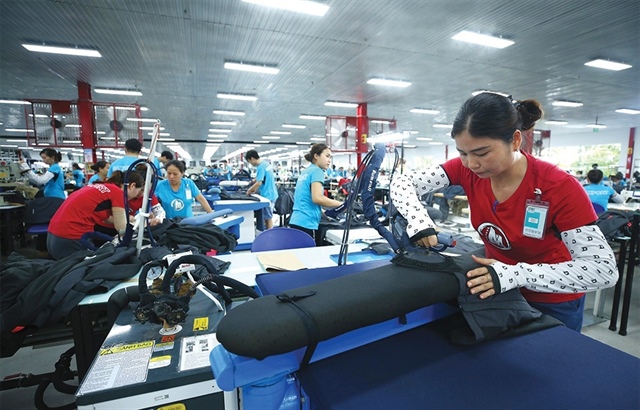|
VAT cut set to continue on through to summer
Though the continuation of a 2 per cent VAT reduction for the first half of 2025 can dent the state budget, there are calls to extend the policy throughout the year, which the government remains cautious about.
This month, a guiding decree is expected to be enacted by the government to maintain the VAT reduction for the first six months of 2025. The policy applies to goods and services currently subject to a 10 per cent VAT rate.

The VAT rate in Vietnam remains among some of the lowest globally
|
The National Assembly (NA) approved the reduction on November 30, marking the fifth time the policy has been implemented to reduce the prices of goods and services and stimulate production and business activities.
Many goods and services remain exempt from this reduction, including telecommunications, IT, financial activities, banking activities, securities, insurance, trading of real estate, metals, precast metal products, mining products (excluding coal mining), coke mining, refined oil, chemical products, and goods and services subject to excise taxes.
The Ministry of Finance (MoF) estimates that this fiscal policy will reduce budget revenue by nearly $1.1 billion. The NA has tasked the government with identifying solutions to ensure budget stability for 2025. For 2025, the state budget is projected to reach $81.95 billion, up 15.6 per cent from 2024 estimates and 5 per cent higher than the expected revenue for 2023.
The policy’s budgetary impact has been notable in recent years. In 2024, the VAT reduction is expected to reduce revenue by $2.04 billion. In 2022, the total reduction was approximately $1.85 billion, and in 2023, it was nearly $2 billion.
Despite these financial considerations, many businesses are still grappling with challenges and are in critical need of support through measures like tax reductions.
Nguyen Van Than, deputy director of Than Nguyen Production and Trade JSC in Hanoi, which operates in wood processing, emphasised the importance of prolonged VAT assistance.
“Businesses like ours are struggling with declining revenues, rising costs, and market challenges. Our revenue has declined by 8 per cent over the past two years, and we’re fighting to maintain operations and keep workers,” Than said. “Extending the VAT reduction for a longer period would provide much-needed relief.”
Tran Thi Thuy, director of Anh Sao Trading Co., Ltd., a home appliance and consumer goods company in the northern province of Hung Yen, said, “This policy has helped us lower product prices and boost sales. Since its introduction in 2022, our sales have increased by 3-4 per cent every six months during the reduction period.”
However, Thuy expressed concerns about the short-term nature of the policy. “We appreciate the initiative, but limiting it to six months at a time makes it difficult for businesses to plan long-term sales and investment strategies. Extending the reduction to a full year would provide greater stability,” she added.
NA deputy Nguyen Ngoc Son from the northern province of Hai Duong also called for a more defined timeline for the reduction.
“Domestic consumption is growing slowly and requires further stimulation. The NA should establish a roadmap for the VAT reduction over a longer period, at least one year, to maximise its effectiveness,” Son said.
Since its initial implementation, the VAT reduction has been reintroduced in six-month intervals. Businesses and policymakers alike have questioned the effectiveness of such short-term measures in fostering sustained economic recovery.
Deputy Prime Minister Ho Duc Phoc highlighted the challenges of balancing fiscal support with the need for sustainable revenue. He said that Vietnam’s VAT rate, at 10 per cent, is among the lowest in the world. In comparison, the average VAT rate is standing at 17 per cent in China, India, and Israel; 24 per cent in the UK; and 20-25 per cent across Europe.
He warned that continuing the 2 per cent reduction for a full year could significantly impact state revenues, making it difficult to address unforeseen economic challenges. “This policy reduces state revenues by $1.1 billion, which means localities and sectors must work harder to meet budget targets. Moreover, solving business difficulties cannot rely solely on tax reductions,” Phoc said.
Phoc emphasised that tax reductions are just one part of a broader strategy to support businesses. “Other measures are equally important, such as removing obstacles in licensing and land procedures, offering credit packages, supporting technology adoption, and expanding market access,” he noted.
While acknowledging the modest financial benefit for individual businesses - approximately $1,250 per enterprise, Phoc said the policy is still a valuable form of encouragement.
The MoF reported that the cumulative value of tax and fee exemptions, reductions, and deferrals in 2023 reached approximately $8.33 billion. This included $3.3 billion in direct exemptions and reductions, and $5.04 billion in payment extensions.
These figures highlight the significant fiscal support provided by the Vietnamese government to mitigate the impact of economic difficulties on businesses and households.
Figures from the General Statistics Office show mixed signals for the business environment. In the first 11 months of 2023, just over 147,200 new enterprises were established, with a total registered capital of $60.44 billion. However, challenges persist. Over 96,200 businesses temporarily ceased operations during this period, a 12.6 per cent increase from the same period last year.
Additionally, 57,700 companies suspended operations while awaiting dissolution procedures (up 1 per cent on-year), and nearly 19,300 businesses completed dissolution (up 19.8 per cent on-year). On average, more than 15,700 businesses exited the market each month.
The National Assembly Economic Committee highlighted several factors contributing to these difficulties. Domestic purchasing power has shown signs of slowing, while inflationary pressures are increasing. Furthermore, exports face numerous challenges, including technical barriers, anti-dumping investigations, and dependence on processed products.
VIR
|